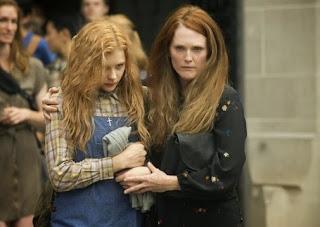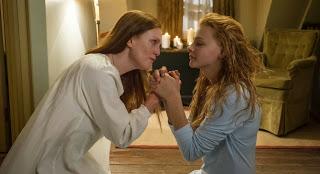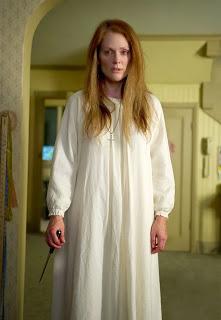
You will know her name.
The Lowdown: As a fan of Stephen King and as a fan of the original Carrie from 1976, I am slightly disappointed in the new remake of Carrie. Is it atrocious? No. Does it offer anything new to the table? Not really, no. It can be commended for being well-acted, but it feels a bit stale overall. Just another remake.1. The Plot: Carrie White (Chloë Grace-Moretz) is a shy teenage outcast who is routinely bullied at high school, namely by the more popular girls, such as Chris (Portia Doubleday) and Sue (Gabriella Wilde). At school, Carrie has her first period after gym class and freaks out, which prompts a wave of bullying from Chris and the other girls in the locker room until Ms. Desjardin (Judy Greer), the gym teacher, puts an end to it. As a result of the incident, Carrie is sent home to her overprotective, psychotic, and super-religious mother Margaret (Julianne Moore), who punishes her for “sinning”.

Meanwhile, Ms. Desjardin lays down punishment for the girls that bullied Carrie. Chris, who started the whole thing and even filmed the incident on her phone, refuses the punishment and is banned from attending prom. Sue, one of the other girls, feels bad about the whole incident, so she persuades her boyfriend Tommy (Ansel Angort) to take Carrie to prom. Chris and her boyfriend Billy (Alex Russell) are still fuming about being banned from prom, so they plot a cruel revenge against Carrie. Let’s just say that unfortunate events happen at prom.

2. The Characters: Chloë Grace-Moretz (Kick-Ass, Let Me In) is Carrie, the shy and sheltered outcast at school who eventually gets pushed to the breaking point. Moretz is a great actress and has done so well in films such as Let Me In (2010). However, something is missing. What makes Carrie such an interesting character is how she has been abused and tormented for her entire life, first by her domineering mother and now by a bunch of jerks at school. Suppressing all of those feelings would be devastating to one’s mental state. With that being said, Moretz doesn’t feel like a character who is about to crack from all of the pressure. She doesn’t seem like she has been withstanding years of anguish and torment. On the other hand, Margaret, Carrie’s mother, is frightening. Played by Julianne Moore (The Big Lebowski, The Kids are All Right), Margaret is every bit the psychotic religious fanatic, although some details are over the top, such as when she is banging her head against the wall repeatedly, convinced that Carrie has sinned. Really, as if locking Carrie in the closet wasn’t enough. More terrifying is her ability to switch from crazy to gentle in a heartbeat. After Carrie prays in the closet and is released, her and her mother exchange “I love yous”.

Not the best mother-daughter relationship.
Ms. Desjardin, the understanding gym teacher, is played by Judy Greer (Arrested Development, Archer). She is probably the only sane and level-headed character in the entire film, and is the voice of reason in the ongoing conflict between Carrie and her bullies. As for the bullies, they are sadly one-dimensional and pretty much just plain awful people. Chris, played by Portia Doubleday, is a complete and total bitch. The same can be said of her equally evil boyfriend Billy, played by Alex Russell. Chris is asked the question “What did Carrie White ever do to you?”, to which there never seems to be a response. I suppose she has to be totally evil because it would make the viewer hate her even more and want her punishment to be fitting. The voice of reason amongst the bullies is Sue, played by Gabriella Wilde. Sue feels extremely guilty about picking on Carrie, even persuading her boyfriend to take Carrie to prom. It makes her more of a human character, and one can’t say that she doesn’t have good intentions.3. Social Outcast: “What did Carrie White ever do to you?” is a startlingly good question. What did she do? Nothing is the correct answer, and yet, nothing good ever happens to Carrie. Why? Perhaps it’s because she is “weird” at school; she doesn’t “fit in”, she “doesn’t have any friends”, she was home-schooled, blah blah blah. Basically, she’s part of the minority and wouldn’t (couldn’t) conform to the norm. Of course, that’s part of the message that Carrie tries to get at. People are mean and society is harsh and unfair territory. That’s just the way it is.

Speaking of mean people.
The other part of the message is that everyone has an emotional breaking point, and it is up to them and everyone around them to prevent that point from being reached. Carrie is constantly on the verge of breaking, but no one seems to notice or care aside from Ms. Desjardin. In the book and in the 1976 film, it was clear that Carrie’s devastating rage at the end of the film was a result of an emotional outcry, years of pent-up emotion that got unleashed all at once. The biggest difference with this remake of Carrie is how Carrie’s transformation seems to be more physical rather than emotional. Carrie discovers her telepathic abilities, and there are several scenes before the prom scene where she uses her abilities to levitate or move objects. She breaks a mirror, lifts her bed, etc. These scenes steer the film in a slightly different direction than the 1976 film. In that film, Carrie’s powers appeared more suddenly, which made a greater impact. There is a scene in the 1976 film where Carrie and her mother argue, and Carrie uses her telekinesis to slam doors and windows violently. This showed what would happen if Carrie was pushed to her limit, and signified that something bad would happen if it was pushed too far. By showing Carrie doing things like move her bed with her mind, it makes it seem like she is training to control her powers, as if she realized she was emotionally distressed and was attempting to calm them down. It’s a slight difference that makes the 2013 film a bit more grounded in reality, although in the long run, it doesn’t make a whole lot of difference and may have been a cause of divided opinions.The Bottom Line: The 2013 remake of Carrie is a decent film, but it can’t touch the original film or the book. The acting is fine, but the film lacks the intense emotional punch that the earlier adaptations had. This remake tried to suppress it a bit, and that might have been a bad decision. Otherwise, there isn’t really anything in this film that hadn’t been seen in the previous adaptations. Even the CGI added to the prom sequence doesn’t make it better. Overall, I would say just stick with the book or the 1976 film.
Carrie is property of Metro-Goldwyn-Mayer, Screen Gems, and Misher Films. This review was written by me.
Like the review? Post a comment. Like us on Facebook: http://www.facebook.com/filmaholicreviewsFollow us on Twitter: https://twitter.com/FilmaholicRvews
Copyright © Filmaholic Reviews, 2013
